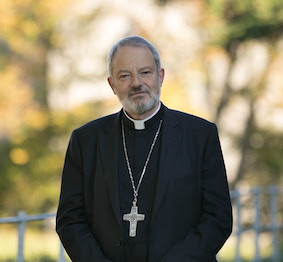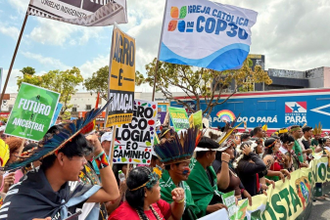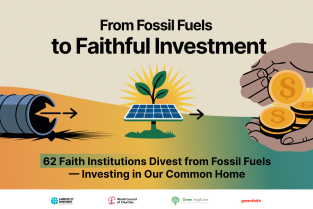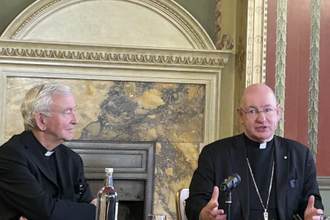Bishop Doran: We need to steward Creation with personal integrity

Bishop Kevin Doran
Bishop Kevin Doran gave this homily during the annual Novena Mass in the Shrine of Knock on Sunday.
A few weeks ago, while I was at the World Youth Day in Lisbon, I began to give some thought to the Scripture readings for today's Mass and to the theme on which I have been asked to speak: 'Stewarding Creation'.
There were hundreds of thousands of young people in Lisbon, from every corner of the earth. Within our own group we had a few who went out of their way to engage in conversation with young people they had never met before and might never meet again. There was a lovely joyful atmosphere in the streets. At times, also, there was a real spirit of prayerfulness. As the week went on, the police visibly relaxed, and I have seen this happen at other World Youth Days. There was something very wholesome about it all.
Many of the big gatherings were in Parque Eduardo which was close to the flight-path of the planes coming in to land in Lisbon Airport, and there were quite a lot of them. Meanwhile, to the north and south of Lisbon, wildfires blazed and, when we went to Fatima later that week, the sky behind the Basilica was dark with smoke.
In his 2015 encyclical letter Laudati Si' on the care of the earth, Pope Francis frequently comments that "everything is connected". Was there a connection between the presence of so many young people in Lisbon, the number of flights, the higher-than-normal temperatures and the forest fires? The science would suggest that there may well be. But like most things, it is not as simple as all that. Simplistic solutions and knee-jerk reactions, more often than not, make problems worse.
We could, of course, cancel international gatherings, ban tourism and tell everyone to stay at home in their own place. In that scenario, we would still be sharing the same universe, facing many of the same challenges, but without the benefit of knowing one another as brothers and sisters. We would be 'us' and 'them'.
The same Pope Francis, who told us that we must care for the earth, which is our common home, has repeatedly urged us to build understanding and fraternity through dialogue in a world without rigid borders. Humanity has always been good at building walls; not just physical walls, but economic and political walls; religious walls and cultural walls, to keep people apart.
Our Scripture readings today, each in its own way, speaks of removing the divisions that keep people apart. Saint Paul talks about Jews and Gentiles being reconciled and enjoying the mercy of God, something that would have beeb unthinkable to him before his own encounter with the risen Jesus. In the Gospel, Jesus takes His disciples to the north, into Tyre and Sidon, way out of their spiritual comfort zone. While the conversation of Jesus with the Syro-Phoenician woman is a little bit uncomfortable to our ears, it seems that Jesus wanted to draw out her profession of faith. In that way He was teaching His disciples to be more inclusive in their vision of who might have a place in the household of God.
In Laudato Si', Pope Francis describes the earth as 'our common home'. It is not just my home, or your home, it is our home. How we care for and live together in our common home depends largely on our respect for one another as one human family under God. That includes the elderly and the children, those who live near us and those who live farther away; those who are as yet unborn, but who will inherit what we build or, indeed, the mess we leave behind us.
People are inclined to dismiss the Creation narratives in the book of Genesis as if they were just some kind of bed-time story for children. They were never meant to be a historical account of what happened over the course of seven days. The passages about creation are poetic reflections, which express the faith of the people of Israel in a good and intelligent Creator. These were people who saw all around them the signs that God intended the earth to be self-sustaining and to serve the needs of humanity, and that he had created humans in his own image for relationship with him.
Pope Francis warns us not to misunderstand what God intended in giving humanity dominion over the earth (Genesis 1:28). In the second Chapter of Genesis, we read that:
'God placed man in the Garden of Eden to cultivate it and to care for it" (Gen. 2.15).
'This implies', Pope Francis says, 'a relationship of mutual responsibility between human beings and nature. Each community can take from the bounty of the earth whatever it needs for subsistence, but it also has the duty to protect the earth and to ensure its fruitfulness for coming generations.' (LS #67).
The Church has always recognised the right of ownership of property and the legitimate boundaries of nations but, from a moral point of view, nothing belongs to us absolutely. Everything is held in trust. Neither can we turn back the pages of history. Our economy these days is far more global than it ever was before. Our actions and the decisions that we make as consumers on one side of the earth, have consequences for producers and workers on other continents. These consequences can be both economic and environmental, because everything is connected. One person's poverty is connected with another person's wealth.
Stewards make an important contribution to many of our gatherings, especially at sporting events and in our Churches. Here in Knock Shrine, we have the Cairde Mhuire and the VAKS. I think of stewards as looking after public safety and finding seats for people. They themselves are usually the last ones to be seated. Perhaps this is a good image for what it means for us to be 'stewards of creation'. It is our responsibility to see to it that there is a place for everyone, and to give particular attention to those who might be vulnerable or at risk. We are not all the same in this. Some of us, by virtue of our role and our responsibilities, can make a small difference on a global level. Others can make a big difference in our own local community. The prophet Isaiah tells us how to go about it: 'have a care for justice; act with integrity'.
Having a care for justice means establishing right relationships. Pope Francis says there are three fundamental and intertwined relationships into which we are called, our relationships 'with God, with one another and with the earth itself' (LS #66). In order to establish those right relationships, I think we are called to pray, to listen and to cultivate.
Some of you will remember a television advertisement for Ronseal, the wood stain, paint and preservative manufacturer, which carried the slogan: 'It does exactly what it says on the tin'. That might be a good definition of integrity. It is about being authentic; not pretending to be something that we are not. In order to create of fairer and more sustainable world, we need joined-up thinking, based on facts rather than opinions. That is the first, practical, step towards integrity. In our modern world we are good at providing answers but not so good, sometimes, at encouraging people to use the gift of reason and to think for themselves. That can be a problem in our education system, in our political system, and indeed in our Church. Insofar as stewarding creation is concerned, using the gift of reason will help us to see more clearly the likely consequences of our actions.
The second stage of integrity is moral integrity. It is when we actually live consistently by the truth we have discovered and by the values that we profess. For us Christians, in the first place, that means following the example of Jesus. It also involves living by the principles of Catholic Social Teaching, which include:
- respect for every human life and for the dignity of every person;
- solidarity, which is a commitment to work for the common good;
- a fairer distribution of the resources of the earth, and an opportunity for everyone to participate; and,
- a particular care for those who are poor and vulnerable.
This use of reason, together with moral integrity, are the foundations on which we exercise our stewardship of creation.
I leave you with one final thought. Towards the end of Laudato Si', Pope Francis encourages us the pray Grace before and after meals (LS #227). This is not just a little exercise in piety. It is about recognising that everything we have and are is a gift. This gift, in the first place comes from God our creator, but it is also 'the work of human hands'. Perhaps the next time you pray the Grace before meals, you might pause to think of the family who milked the cow, who grew the rice, who caught the fish, or who picked and roasted the coffee beans. It would be a way to connect more directly with the earth and with all those who share it with us.
Bishop Kevin Doran is Bishop of Elphin. This homily was preached on 20 August 2023 during Mass at the annual Novena at the International and Eucharistic Shrine in Knock, Co Mayo, in the Archdiocese of Tuam.


















